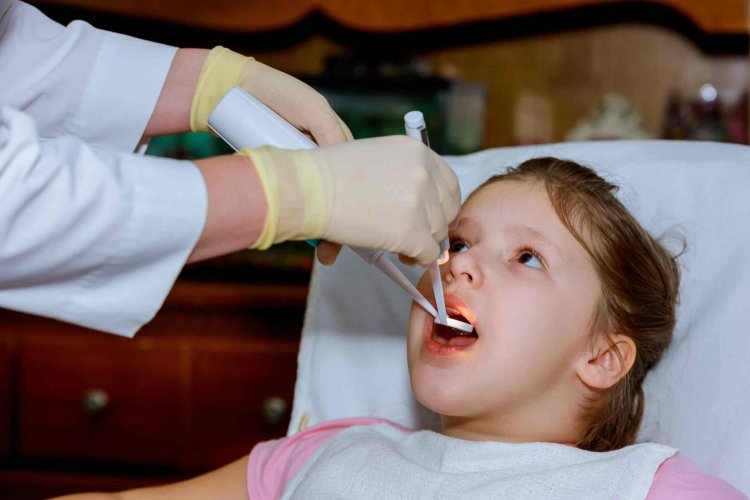Debunking Common Myths About Children's Oral Health
Explore common myths about children's oral health and learn the truth from experts at Odonto Dental. Healthy habits start early!

As parents, we all want the best for our children — especially when it comes to their health. But when it comes to oral care, there's a sea of myths floating around that can confuse even the most well-intentioned caregivers. From brushing routines to baby teeth beliefs, it's time to set the record straight.
In this blog, we’re digging into the most common misconceptions about children’s oral health and revealing the truths behind them. Whether you're a first-time parent or just brushing up on your knowledge, this guide will help you keep your child’s smile healthy and bright.
Myth #1: Baby Teeth Don’t Matter — They’ll Fall Out Anyway
This is hands-down the most common myth about kids’ dental care. Many parents think since baby teeth are temporary, they don’t need as much attention. But the reality? Baby teeth are crucial.
They help children speak clearly, chew properly, and hold space for their permanent teeth. If a baby tooth is lost too early due to decay or neglect, it can lead to misaligned adult teeth or bite issues later on.
Truth: Baby teeth lay the foundation for lifelong oral health.
Myth #2: Kids Don’t Need to See a Dentist Until They’re Older
A lot of parents delay that first dental visit, thinking it’s better to wait until their child has a full set of teeth. The American Academy of Pediatric Dentistry, however, recommends that children see a dentist by their first birthday or within six months after the first tooth erupts.
Truth: Early dental visits help detect potential issues and get your child used to the dentist's chair, creating a stress-free experience.
Myth #3: Cavities Are Only Caused by Sugar
Yes, sugar plays a major role in tooth decay — but it’s not the only villain. Starchy foods, acidic drinks, poor brushing habits, and even some medications can contribute to cavities.
Truth: Oral hygiene habits, diet, and genetics all play a role in cavity formation.
Encourage your child to rinse their mouth with water after snacks, brush twice daily, and visit the dentist regularly.
Myth #4: Fluoride Is Dangerous for Children
Some parents worry that fluoride is harmful or unnecessary. In truth, fluoride is a naturally occurring mineral that strengthens tooth enamel and helps prevent decay — especially in growing children.
While too much fluoride can cause mild white spots on teeth (fluorosis), regulated levels in toothpaste and drinking water are perfectly safe.
Truth: Fluoride, when used properly, is a powerful tool to protect your child’s smile.
Myth #5: Brushing Harder Means Cleaning Better
It’s easy to think that scrubbing teeth harder gets rid of more plaque — but for kids (and adults), aggressive brushing can actually wear down enamel and damage gums.
Soft, circular motions with a kid-friendly toothbrush and fluoride toothpaste do the job just fine.
Truth: Gentle brushing is more effective and less damaging in the long run.
Myth #6: If My Child Doesn’t Complain, Their Teeth Must Be Fine
Tooth decay often starts silently, and kids don’t always notice (or say) when something feels wrong. Waiting for symptoms can mean discovering problems only when they’ve become painful — or expensive — to fix.
Even if your child says everything feels fine, regular dental checkups are essential. If you’re searching for a dentist near you, find one experienced with children’s needs and who knows how to make visits fun and stress-free.
Truth: Regular checkups catch issues before they become serious, even if your child isn’t showing signs.
Myth #7: Children Don’t Need to Floss Until They’re Older
Flossing is often overlooked in children’s dental routines. Many believe it’s something to start only when adult teeth come in. But guess what? As soon as two teeth touch, it’s time to floss.
Bacteria and food particles hide in those tight spaces, and brushing alone can’t reach them. Start flossing early, and make it a daily habit, just like brushing.
If you're considering Children's Dentistry in Windsor, know that pediatric dentists offer the right guidance and support for teaching good habits like flossing from the start.
Truth: Flossing should begin as soon as teeth start to touch — no matter your child’s age.
Myth #8: It’s Too Early to Worry About Orthodontics
Braces and retainers might seem like a teenage rite of passage, but did you know that early orthodontic evaluations can help prevent more serious problems later?
By age 7, a dentist can evaluate bite alignment, jaw growth, and spacing issues. Early intervention might even reduce the need for braces altogether!
Truth: Early orthodontic care can simplify or even prevent complex treatments in the future.
Myth #9: Chewing Gum Is Always Bad for Kids
While sugary gum can certainly contribute to cavities, sugar-free chewing gum (especially those with xylitol) can actually be beneficial. It increases saliva production, helping to wash away food particles and neutralize acid in the mouth.
Just be sure your child is old enough to chew gum safely and understands not to swallow it.
Truth: Sugar-free gum can be a tooth-friendly treat in moderation.
Creating a Bright Future for Little Smiles
Now that we’ve debunked the top myths about children’s oral health, it’s clear that starting early, staying consistent, and working with the right dental team is the key to long-term success.
At Odonto Dental, we’re passionate about providing exceptional care tailored specifically for your child. If you’re looking for a trusted Dental Clinic in Windsor, our experienced team is here to support every step of your child’s oral health journey — from baby teeth to braces and beyond.
What's Your Reaction?

















